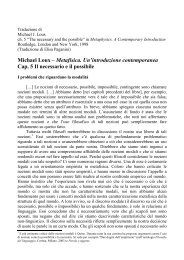guida ai corsi triennali 03-04.pdf - Dipartimento di Filosofia ...
guida ai corsi triennali 03-04.pdf - Dipartimento di Filosofia ...
guida ai corsi triennali 03-04.pdf - Dipartimento di Filosofia ...
You also want an ePaper? Increase the reach of your titles
YUMPU automatically turns print PDFs into web optimized ePapers that Google loves.
CorrectionsThe bill establishes that the minimum wage for participants in prison industries programsunder the supervision of the Texas Youth Commission is the federal minimum wage andauthorizes the Private Sector Prison Industries Oversight Authority to establish deductions forthose participants that are <strong>di</strong>fferent from the deductions established for other participants. Thebill requires other program participants to be p<strong>ai</strong>d the prison industry enhancement certificationprogram wage, computed by the Texas Workforce Commission, rather than the prev<strong>ai</strong>ling wagecomputed by the authority.The bill requires the manufacturing and logistics <strong>di</strong>vision and the institutional <strong>di</strong>vision towork together in supervising the production and sale of inmates’ arts and crafts. The billrequires the Texas Department of Transportation (TxDOT) to reimburse TDCJ, rather than theinstitutional <strong>di</strong>vision, for the cost of manufacturing license plates and registration insignia.When manufacturing is started, and after negotiations, TDCJ, the Texas Buil<strong>di</strong>ng andProcurement Commission, and TxDOT are required to set a price for each license plate an<strong>di</strong>nsignia.House Bill 1660House Author: FloresEffective: 9-1-<strong>03</strong>Senate Sponsor: HinojosaHouse Bill 1660 amends the Local Government Code to require the Texas Commission onJ<strong>ai</strong>l Standards to submit a report regar<strong>di</strong>ng installation and operation of a video camerasurveillance system in county j<strong>ai</strong>ls to the presi<strong>di</strong>ng officer of each house of the legislature andto the presi<strong>di</strong>ng officer of the stan<strong>di</strong>ng committee of the house of representatives havingprimary juris<strong>di</strong>ction over county aff<strong>ai</strong>rs not later than December 1, 2004. The report mustaddress the feasibility of installing and operating video camera surveillance systems thatrecord video images in cert<strong>ai</strong>n areas of the county j<strong>ai</strong>l, evolutionary changes in technologyaffecting the installation and operation, the potential sources of county revenue to pay forvideo camera surveillance systems, identification of other areas that should be monitored inthe county j<strong>ai</strong>l, and the feasibility of using other means to address the issues presenting theneed for the surveillance systems. The report also includes statistics gathered by the commissionregar<strong>di</strong>ng specific j<strong>ai</strong>l issues by county. The provisions of this bill expire December 2, 2004.House Bill 1670House Author: AllenEffective: 9-1-<strong>03</strong>Senate Sponsor: WhitmireHouse Bill 1670 amends the Government Code to authorize an inmate, other than aninmate serving a sentence of death or having a reportable conviction or adju<strong>di</strong>cation under theSex Offender Registration Program, to be released on me<strong>di</strong>cally recommended intensivesupervision (MRIS) on a date designated by cert<strong>ai</strong>n parole panels. The bill only allows aninmate convicted of cert<strong>ai</strong>n serious felony offenses to be considered for MRIS if a me<strong>di</strong>calcon<strong>di</strong>tion of terminal illness or long-term care has been <strong>di</strong>agnosed. The bill authorizes aninmate who is not a U.S. citizen, who is not serving a sentence of death, and who is notrequired to register as a sex offender, or has not been convicted of cert<strong>ai</strong>n felony offenses to bereleased to immigration authorities pen<strong>di</strong>ng deportation. The bill requires the parole panel todetermine that on release the inmate would be deported to another country, is not a threat topublic safety, and is unlikely to reenter this country illegally.The bill provides that only cert<strong>ai</strong>n parole panels composed of the presi<strong>di</strong>ng officer of theBoard of Pardons and Paroles and two members appointed by the presi<strong>di</strong>ng officer may makedeterminations regar<strong>di</strong>ng the release of inmates on MRIS or deportation. The bill requires theTexas Council on Offenders with Mental Imp<strong>ai</strong>rments to provide information to the panelregar<strong>di</strong>ng inmates who have been identified as can<strong>di</strong>dates for potential release under MRIS.45



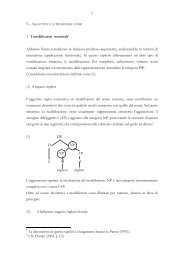
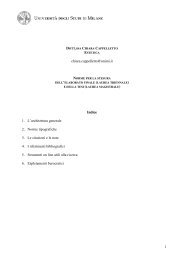
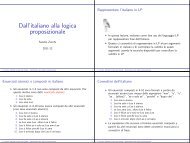


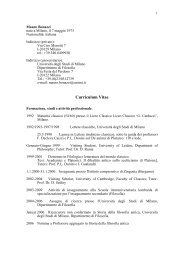



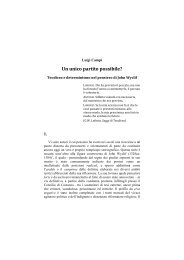

![La teoria dei condizionali [0.2in] di Stalnaker - Dipartimento di Filosofia](https://img.yumpu.com/43208857/1/190x135/la-teoria-dei-condizionali-02in-di-stalnaker-dipartimento-di-filosofia.jpg?quality=85)

